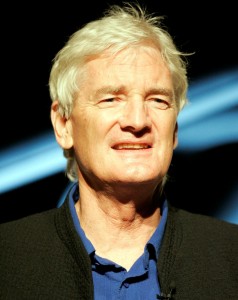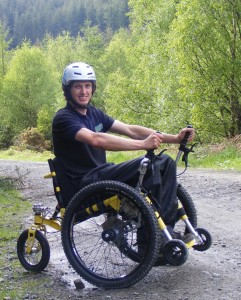Inventor and entrepreneur Sir James Dyson, best known for his bagless vacuum cleaner, and Bath University graduate Tim Morgan, the mastermind behind The Mountain Trike Company, are going head-to-head in a vote to find Britain’s best modern engineer.
The pair – both of whom started their careers in Bath – are among a five-strong short list of contemporary achievers making their mark on the world of engineering. They will rank alongside such greats as Isambard Kingdom Brunel, George Stephenso n and Barnes Wallace.
n and Barnes Wallace.
Sir James Dyson, pictured right, has strong links with Bath, having started as a designer at city-based engineering group Rotork. He lives at Dodington Park stately home, near Bath.
Tim Morgan, pictured below, has invented a number of patented systems for an all-terrain wheelchair which enables wheelchair users to enjoy the countryside independently. His Mountain Trike company was launched in Bath.
He received a first class degree in a Masters of Engineering at University of Bath and was a design engineer with one of the world’s most prestigious car manufacturers. He is now working on Mountain Trike full time, running the company, managing production and working on future designs.
They are up against mechanical engineer David Gow, electrical generation engineer Sam Etherington, and Jonathan Ive, Apple’s senior vice president of design and the man behind the iMac and iPhone.
The Engineering Hall of Fame, launched by sector skills group Semta, is designed to ensure great British engineers of the 21st century are recognised as important and influential as their illustrious predecessors.
Ten 19th and 20th Century engineers will be invested in to the Semta Hall of Fame having been selected by a panel of engineers.
They will be joined by one of the contemporary nominees who will achieve immortality alongside them at a ceremony in London on February 12 during the inaugural Semta Skills Awards. 
Semta chief operating officer Ann Watson said: “Britain’s engineers are still the best in the world – and we will be putting them on the world stage to take a bow alongside their illustrious predecessors.
“We are blowing away the myth that the best days of British engineering are behind us – we say not so – ensuring that one of our five nominees achieves engineering ‘immortality’.
“The Semta Skills Awards will shine the spotlight on those scaling great heights in modern Britain and those that have done so down the centuries – with the aim of inspiring the next generation of engineering talent to do so in the future.”
The public can vote for the next resident of the Semta Hall of Fame online at http://www.semta.org.uk/hall-of-fame-vote



















